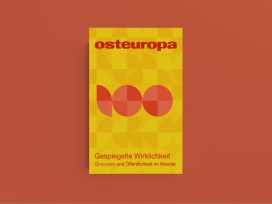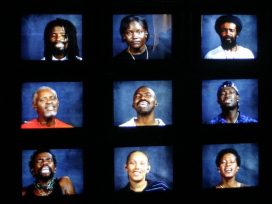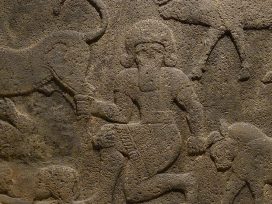If Croatian literature in the 1990s was marked by a series of questions – about continuity and discontinuity, about changes in the genre system and the emergence of a new poetics – contemporary Croatian literature is characterized by a steady output, predominantly of novels and short story collections. Poetic production is considerable in terms of its range, while its quality is perhaps higher than that of prose; however it is marginalized, especially in the media. While this does not detract from its symbolic value, poetic texts, and generally speaking drama as well, have a significantly smaller readership.
The Croatian Ministry of Culture receives nearly two thousand applications for co-financing of books every year – a lot for a country of some four million inhabitants. Despite the Ministry’s support for authors and its policy of buying up books, and although significant numbers of titles are published, it is clear that the publishing industry is not autonomous. The main reason for this is that, save for the partial efforts of the larger publishers, there has been a failure to restore the distribution network after it was destroyed in the 1990s.
Cultural columns are gradually disappearing from daily newspapers; either that, or they overlap with “lifestyle” items or scandals connected with the entertainment industry. On public television channels, features about culture are reduced to minimal “cultural news” items, while they never even existed on commercial stations. It would be hard to describe more than a handful of writers as professional “literary critics”; literary criticism has become a secondary and irregular activity limited to literary magazines with print runs numbering just a few hundred. Bestseller lists, and lists of books borrowed from public libraries, are almost invariably topped by translations of international, on the whole Anglo-American hits. The Secret Life of Hitler? Climate Cataclysm? The Causes of the Global Crisis? Yes, those are all potential titles of Croatian bestsellers, which can only be outsold by the scandalous memoirs of some politician or starlet.
Discussions about the loss of distinction between high- and low-brow literature, about the blossoming of popular genres and “the democratization of writing”, and about the relation between literary quality and the large number of non-professional publishers, has had one positive effect. It has contributed, namely, to raising the average standard of literary production and to forming a relatively stable reading public. People now regularly choose new titles by Croatian authors, not expecting them to be Proust, Kafka or Joyce, but to be what they are: Feric, Tomic, Drakulic, Jergovic, Ugresic, Tribuson, Koscec – tried and tested local writers.
Individual rather than collective poetics
Although it is reasonable to try to assess new literary titles in terms of their context, and thus to link them with recognizable trends, it seems to me that the key quality of contemporary Croatian literary production is the simultaneous existence of several individual poetics. We could chose to follow the formation of certain groups, or identify common denominators (women’s writing, war writing); yet the output of many writers, male and female, bears witness to the distinct identity of their literary opus. This is how I would prefer to interpret the novels published in the last two years by Irena Vrkljan and Slavenka Drakulic, despite the fact that their works were characterized by literary critics as “women’s writing” as early as the 1980s.
While Irena Vrkljan (b.1931) cannot be considered an explicitly feminist writer, her novels may be analysed within that framework. In her first novel, Svila, skare (1984; published in English as: The Silk, the Shears, 1999), Vrkljan creates a fragmented narrative about her own growth to adulthood, through the prism of specifically female experience, such as emancipation and sexuality, social status and the family, and questions of intellectual and artistic activity. In her second novel, Marina ili o biografiji (1986; published in English as: Marina or About Biography, 1999), she writes the biography of the Russian poet Marina Tsvetaeva in parallel with the story of her own life. Vrkljan returns to similar themes in her later works, Pisma mladoj zeni (Letters to a young woman, 2003), her intimate essays Nase ljubavi, nase bolesti (Our loves, our ailments, 2004), and the novels Zelene carape (Green stockings, 2005) and Sestra, kao iza stakla (Sister, as though through glass, 2006). Through these works, Vrkljan creates an exceptionally coherent opus in which the specifically female narrative voice in her writing is emphasized. The title of her latest work of prose, Svila nestala, skare ostale (The silk went, the scissors remained, 2008), clearly refers to the The Silk, the Shears, her first novel published twenty years earlier. This work too contains her characteristic narrative procedure, with key moments poetically highlighted, familiar from the novel Silk, Scissors, through Marina Or About Biography, right up to Our Loves, Our Ailments, with its quality of a testimonial.
The opus of writer and journalist Slavenka Drakulic (b.1948) has from its inception been characterized by the treatment of women’s themes, particularly the body and sickness. Following her collection of feminist essays, Smrtni grijesi feminizma (The deadly sins of feminism,1984), the cult book of Croatian feminism, Drakulic published the novels Hologrami straha (1988; published in English as Holograms of fear, 1992), Mramorna koza (1989; published in English as Marble Skin, 1993), Bozanska glad (1995; published in English as The Taste of a Man, 1996) and Kao da me nema (1999, published in English as As If I Am Not There, 1999). Drakulic’s latest novel Frida (2007; published in English as Frida’s Bed, 2008) relates in narrative form the artistic and personal biography of the Mexican painter Frida Kahlo.
The central theme of all Drakulic’s novels is the female body – from a body exposed to illness to a body devouring out of love and a body subjected to violence. All the basic features of a feminist text are connected in her novels: the female narrative voice speaks from a female perspective about specifically female experience. In addition, in the sense of public engagement, Drakulic takes the emphatically feminist position that every private action is at the same time public. Her narrative interest in Frida Kahlo focuses the theme of the female in the central connections between the body and sickness as trauma, the body and pleasure, the body as the object and subject of artistic expression.
On the other hand, the novel Baba Jaga je snijela jaje (2008; published in English as Baba Yaga Laid an Egg, 2009) by Dubravka Ugresic represents a marked thematic divergence from the novels that preceded it at the end of the 1990s (Muzej bezuvjetne predaje, published in English as The Museum of Unconditional Surrender, 2002; Ministarstvo boli, published in English as The Ministry of Pain, 2007). In it, Ugresic has abandoned the position of “a first-person narrator in exile”. By means of its narrative-essayistic construction, which combines autobiographical narrative, parodic fiction and ethnological essay, the novel emphasizes Ugresic’s authorial impulse to play with narrative stereotypes. Critics have characterized it, on the one hand, as a compendium of postmodern strategies of writing, and on the other have stressed Ugresic’s interest in transforming both of the mythic figure of the Slav Baba Yaga and the stereotype of femininity – and particularly female aging – in contemporary western culture. Ugresic’s early novel, Stefica Cvek u raljama zivota (1981; published in English in The Jaws of Life and Other Stories, 1993), with its fundamental poetic qualities, its parodic tone and its play with the stereotypes of the love story, could be seen as a precursor of contemporary Croatian urban women’s writing. In Baba Yaga, too, irony, parody and witty narration have freed both readers and critics of the burden of thinking about elderly female characters as oppressed subjects, even though the text produces a distinct sense of bitterness.
A new generation of readers and writers
The Anglo-American popular genre of chick-lit has not inspired an equivalent movement in the Croatian literary space, despite initial indications that it would. Post-feminist literary trends are most evident in “marginal” literary genres such as newspaper columns. There are several such columnists in the contemporary Croatian literary scene, all of whom use the first-person narrative: Rujana Jeger, Milana Vukovic Runjic, Arijana Culina, Vedrana Rudan, and Julijana Matanovic. All these writers have tried their hand at other genres (novels, short stories), but it is their journalism that has given them a prominent media presence and made them popular with their readership: their collections of journalism are among the most widely read titles on the market. The hatchet that during the war cut chick-lit off from serious literature has not been buried to this day. The conviction that newspaper columns written by female journalists are a lesser form of literature is so strong that the even the writers themselves often deny any connection with chick-lit or with post-feminism and feminism as a whole.
Journalism of this kind is read today in Croatia precisely because the everyday succeeds in crossing the threshold into literature – in the form of broken refrigerators, crates of emptied beer bottles, clumsily ruined marriages, daily frustrations and irony. Putting to one side media promotion and the journalistic mixing of genres, which are often quoted as negative, inauthentic and unliterary, the fundamental reason for the popularity of this type of writing lies in the fact that changes in literary production and its place in cultural activity has shaped a new generation of readers, with new habits and new needs. I am not thinking here of age criteria differentiating “old” readers from “new” ones, but a process of “awareness raising” among a reading public that wants to read stories about life that are relevant and here and now. At last, they have been given that kind of literature.
The voice of the new generation in this narrative space is represented by the novel Slobostina Barbie (Barbie’s privileges, 2008) by Masa Kolanovic, a writer who has grown up alongside the “coming of age” of the new transitional state. Kolanovic (b.1979) gives a voice to the generation that grew up during the destruction of socialist models of identity and that must reconstruct for itself the cultural memory destroyed in the 1990s. Slobostina Barbie is a novel about growing up, set during the war, written from the perspective of a little girl living in a tower block in New Zagreb, whose greatest problem, as she sees it, is how to protect her collection of Barbie dolls from the violence. Kolanovic is an ironic but warm storyteller; her narrator is preoccupied with observing the many changes that accumulate in her child’s head in a critical but humorous way. In addition to being an excellent writer, Kolanovic is also an excellent illustrator, and her novel is adorned with her own drawings, again childish but also ironic.
Literary critics with a preference for popular culture have found in this novel plenty of material for cultural analysis, from the social and political context to the formation of the young girl’s identity. Slobostina Barbie is a novel that entices readers, even if its appeal is the pre-modern emotional identification of reader and hero, or more precisely of woman reader and heroine. Here, the women’s right to a public is realized as the right to literature of quality, which is not diminished by the fact of its being entertaining. This female urban prose deliberately rejects the informative or didactic mode, yet it strengthens processes of self-knowledge and self-affirmation in its women readers.
Postwar and post-traumatic literature
In a general review of trends in recent Croatian literature, one common denominator, which may also be traced in Masa Kolanovic’s work, is the theme of postwar and post-traumatic literature. While the second half of the 1990s was marked by a body of “war literature”, the last decade has seen a rise in awareness-raising topics – both in prose and drama – such as illegal privatization, corruption, the social marginalization of war veterans. Examples would be Alen Bovi’s novel Metastaze (Metastases, 2006); Robert Perisic’s novel Nas covjek na terenu (Our man in the field, 2007); Mato Matisic’s postwar trilogy of plays, Niciji sin (No one’s son, 2006), Zena bez tijela (Woman without a body,2006), and Sinovi umiru prvi (Sons die first, 2006); Ivan Vidic’s play Veliki bijeli zec (The big white rabbit, 2002); Ivana Sajko’s play, Zenabomba (Bombshell, 2004) and her novel Rio bar (The Rio bar, 2006). The social underbelly is also portrayed in Edo Vujevic’s novel U sfinginoj sjeni (In the shadow of the sphinx, 2008) and in Sladana Bukovac’s Rod avetnjaka (A tribe of ghosts, 2008).
This latter novel reveals Bukovac’s (b.1971) developing narrative interest in an ironic analysis of Croatian reality. Abandoning the fictional direction of her first work, Putnici (Travellers), an atypical love story, Bukovac’s narrative space moves into an open psychiatric ward for sufferers of post-traumatic stress. It is a space where marginal types meet, people placed on the fringes of Croatian reality. For the most part they are war veterans for whom the post-traumatic stress disorder is connected with basic survival and existential problems. The effect is an inter-relationship of juxtaposed characters, whose destinies are refracted through the prism of the observer – the psychiatrist Pavel. His understanding of reality combines an attempt to understand the psyche of an individual with an interpretation of psychiatric problems as a reflection of politics. In such an understanding, the personal is to a large extent shaped by the super-personal, while privacy is determined by the public mores and is intimately connected to social consciousness.
Bukovac’s narrative gift in dealing with intimate themes without direct contextualisation in Croatian reality develops here as a deconstruction of daily urban life. On the one hand, Bukovac seeks to give shape to individual consciousness and to create characters with complex inner worlds; on the other, as an ironically and socially-conscious narrator, she deconstructs her characters, drawing attention to the difficulties establishing personal identity in the socio-political circumstances of contemporary reality. Traumatization (the psychiatric term for what ordinarily would be called unhappiness), a condition that links all the characters with their observer/psychiatrist, emerges as a subject the full articulation and resolution of which is impossible: continuing to live without a resolution is all that is left to the characters, suicide is the only possible catharsis.
The new novel by Renato Baretic (b.1963), whose work Osmi povjerenik (The eighth commissioner) was showered with literary prizes when it was published in 2003, also unites the wartime and the post-war periods. Hotel Grand (2008) describes wartime Split through the lens of the present: the main character, Filip, who is also the narrator, is staying in the hotel where he grew up during the war. The hotel cum brothel, and its cast of war profiteers, middle-men, prostitutes, smugglers and UN soldiers, provides the stage for a family drama that leaves traumatic marks on the child. Although the subject matter places him in the so-called “Split black school”, in which critics usually also place Boris Dezulovic and Jurica Pavicic, Baretic’s novel contains all the characteristics of the writer’s previous narratives, above all their feeling for language and direct speech, painstaking composition and ironic-parodic touches. In Hotel Grand, these qualities emerge via the narration of the novel in the form of a blog. In other words, Hotel Grand is read as it is published on the web, as it were. This markedly postmodernist procedure invests the work with Baretic’s awareness of traditional novel writing in the context of new forms of electronic communication.
In tracing the investigation of the relationship between the personal and collective past, it is important to mention Ratko Cvetnic (b.1957). Cvetnic’s first novel Kratki izlet (Brief excursion, 1997) is seen as one of the best works – many would say the best – of Croatian war literature. With it, Cvetnic emerged as an ironic and socially conscious narrator and critical essayist. His narrative reflects the destinies of well-realized characters who resist the mechanisms of collective identity and the manifestations of mass psychology so often present in situations of war.
Cvetnic’s new novel Polusan (Half-sleep, 2009) is set in Zagreb at the end of the 1980s, at a time when the socialist system was unravelling and new political and ideological values were beginning to emerge. The main character of Polusan is the twenty-eight year old law student Vjekoslav Modric, whose first-person narrative describes the events. The irony and distance that characterize Modric are also features of the narrative: ironic and distanced. The other main character is Hrvoje Modric, Vjeko’s cousin and contemporary, whose way of life stands in antagonistic relation to the “life choices” of the main character. Their alternate narration of events over a year-and-a-half creates an image of Zagreb and Croatian reality at a time of change in both their personal, but also collective cultural identities. The composition of the novel by months (from the April of one year to September of the next) enables Cvetnic to create a special kind of rhythmic narration: over the course of time, which seems “natural”, he condenses his narration into individual moments – key ones for the protagonists.
Vjekoslav Modric is a kind of contemporary “rogue”, a roving urban intellectual figure whose biography reveals different spectra of Croatian reality in the late 1980s and early 1990s. Modric moves from job to job: as a worker at a cold-storage plant; an attendant at an art gallery; a proofreader at the newspaper Vjesnik; an employee in a business in the process of privatization. Taking his characters from one generation and setting the story over a relatively short space of time, Cvetnic accurately expresses the paradoxes of the epoch. On one hand, the second half of the 1980s was a time in which history apparently “stopped”; on the other hand, there was an accumulation of events following the fall of the Berlin wall – the emergence of the first civic political parties and the total transformation of political life. Cvetnic is aware of this, both as author and as the narrator Vjeko Modric, and the novel is therefore placed against the background of historical and documentary reality. Yet Polusan is neither a “roman à clef”, nor a story founded in the documentary mode, but rather a novel of contemporary characters in a specific historical moment. One could say that, paradoxically, it is a postwar novel narrated in the pre-history of the war. A “fictionalization” of history functions to create a convincing narrative world, a contemporary variation on existentialist narratives.
The narratives we have been able to witness over the last two years are, in terms of their poetic style, varied; yet all these novels aim to deconstruct existing stereotypes and dismantle the key images dominating the Croatian literary, journalistic and media landscape. By means of various narrative procedures, worlds have been formed that are seen from the perspective of individual characters, rather than with the help of pre-existing cultural-historical assumptions.
Conscious of the tension that exists between personal and collective identity, contemporary Croatian prose writers choose to narrate situations that expressly illuminate the difference between the main character and standards of conventional behaviour. A preference for the socially marginal and marginalized often leads them to describe urban daily life through “minor stories” that do not belong to the dominant majority. This makes the contemporary literary moment especially interesting, since it creates narratives in which there are no final, shared answers to existential questions, but only individual and various literary choices.






